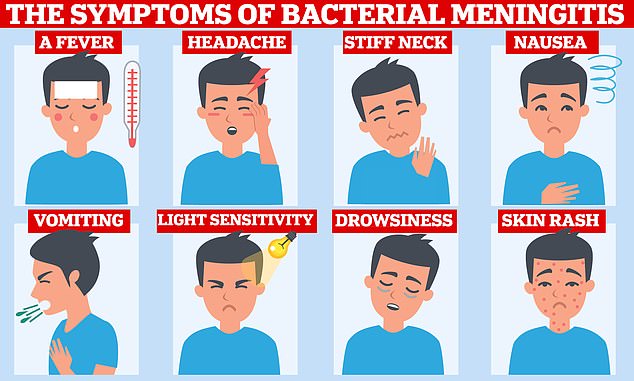UK health leaders issue urgent warning over deadly ‘student virus’
British health authorities are urging university students to get vaccinated to protect against deadly meningitis.
Newcomers are at high risk of contracting this life-threatening infection because they often come into contact with many new people.
In a statement from the UK Health Security Agency (UKHSA), experts warn that every year students are becoming “seriously ill and some sadly die” from this preventable disease.
In England, all pupils in Years 9 or 10 are offered the meningitis vaccine, called MenACWY. The vaccine protects them against four different types of meningococcal bacteria that can cause meningitis and septicaemia.
According to experts, the number of meningitis cases usually increases around September, in line with the start of the new academic year.

Bacterial meningitis, which requires urgent hospital treatment, affects the membranes in the spinal cord and brain
Sepsis is a life-threatening infection of the blood, while meningitis means that pathogens have invaded the protective membranes surrounding the brain and spinal cord
The number of cases more than doubled in early 2020 and late 2021, from 80 to 205. However, experts say the exceptionally low numbers in 2020 are due to the pandemic.
Experts are urging young people to make sure they have their free NHS vaccinations against meningitis, measles and HPV for children and adolescents, ahead of the start of the new school year.
“We typically see an increase in the number of meningococcal meningitis cases after the university term starts in September,” said Dr Shamez Ladhani, consultant epidemiologist at UKHSA.
‘New and returning students from across the country and overseas coming together and interacting with each other makes it easy for infections to spread. Some students are becoming seriously ill and in some cases, unfortunately, people are even dying.’
‘I urge young people starting or returning to university to check that their MenACWY, HPV and MMR vaccinations are up to date and to contact their GP if they are unsure about what to do.’
Mothers who lost their children to meningitis are also urging schoolchildren to get vaccinated.
Lauren Sandell died in 2016 at the age of 18, during her first year of university, from complications of meningitis.
Her mother Sharon Sandell, from Woodford Green, London, said: ‘Lauren was feeling unwell on a Thursday evening during her first year at university.
She thought it was the stress of adjusting to university.
‘She came home on Saturday night with pain in her legs and said she didn’t feel 100 percent.
‘Then on Sunday morning she became ill and was visibly shaking.
‘We really thought it was a panic attack and at no point did I think her life was in danger.
“I will always be grateful that she was home with me when she died, but the experience of witnessing it will stay with me forever.”
An inquest into Lauren’s death in 2018 found that her GP practice had failed to send text messages reminding people to get the MenACWY jab.
Another grieving mother, Michelle Bresnahan, whose son Ryan died of meningitis in 2010, also urged college students to make sure their vaccinations were up to date.
Mrs Bresnahan told Sky News her “wonderful boy” had complained of headaches, nausea and fatigue on the morning of his death.
“He was in a good mood, he was actually supposed to be studying for his GSCEs, so we put that aside for the day and decided to just have a rest day,” she said.
Mrs Bresnahan says she quickly went out to get him something to eat and drink to make him feel better, but returned to find a ‘nightmare’.
“Within 45 minutes I was home and an ambulance was at the door telling us Ryan had meningitis and was in a very bad way,” she said.
‘By lunchtime we were calling our friends and family to tell them Ryan had passed away.’
Ryan died five years before the MenACWY vaccine was routinely offered to young people.
His mother urged people to check for the virus and protect themselves and their loved ones.
“If you’re listening and you’re going to university or college, or you know someone who is, check that you’ve had the vaccination. If you haven’t, book one with your GP today,” she said.
“There is still time to protect yourself from this terrible disease.”

Lauren Sandell died at age 18 during her first year of university in 2016 after contracting meningitis

When he woke up with a throbbing head and feeling nauseous, student Ben de Souza attributed his symptoms to a hangover and decided the only thing he could do was stay in bed
Just eight weeks into his first year at the University of Portsmouth in 2019, Ben de Souza, a 19-year-old business student from Burgess Hill, West Sussex, was diagnosed with a particularly aggressive form of meningitis B, a strain responsible for most cases of bacterial meningitis.
The night before he had gone out with friends from the university cricket club.
But as the day progressed, he vomited ten times and became more and more sleepy.
It was a mistake that nearly cost Ben his life: 12 hours later, on November 30, 2019, he was rushed to intensive care, where he fought for survival for five days.
By the time emergency services arrived, Ben couldn’t even tell them his name. Shortly after arriving at Queen Alexandra Hospital in Portsmouth, he became unconscious and had to be put on a ventilator.
Although there was no sepsis, the meningitis caused his brain to swell and put pressure on his spinal cord, a process called coning that usually occurs shortly before death.
In desperation, doctors pumped his body full of saline to relieve the pressure on his brain, a procedure that undoubtedly saved his life.
But an MRI scan later that day revealed that the stress on his body had caused him to suffer two strokes in the area that controls movement and breathing.
Doctors were unsure whether he would survive, but remarkably, he slowly regained consciousness over the following days.
